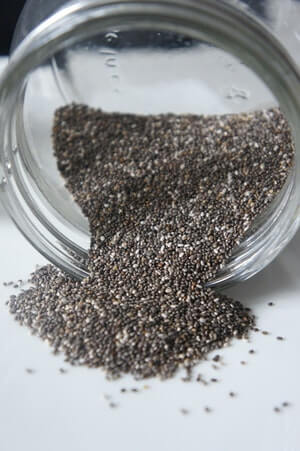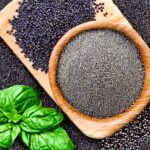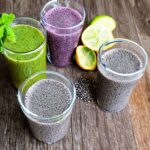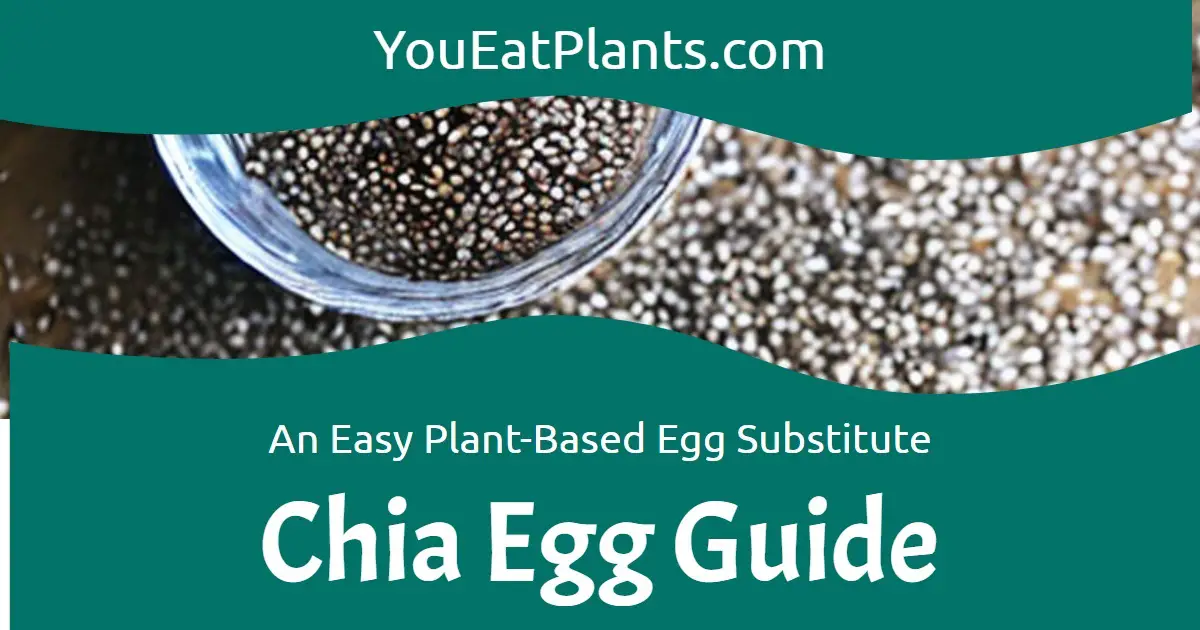
Chia seeds are a nutritious and convenient option for those looking to incorporate more plant-based protein and fiber into their diet. Using chia eggs as a vegan egg substitute is a great way to add these nutrients to your recipes, while also providing a source of sustained energy and nutrition.
In this post, we will look at the chia egg including what it is, how to make it, the benefits, and more!
- What is a Chia Egg?
- How to Make a Chia Egg
- Chia Egg Benefits
- When Not to Use a Chia Egg
- How Much Chia Equals 2 Eggs?
- Chia Egg vs Egg
- Chia Egg to Egg Ratio
- Chia Egg Recipe
- Final Thoughts
What is a Chia Egg?
Chia seeds are a small, nutrient-rich seed that have gained popularity in recent years due to their numerous health benefits. These seeds are high in fiber, omega-3 fatty acids, and protein, making them a great addition to any diet. One way to incorporate chia seeds into your diet is by using them as a vegan egg substitute, known as a chia egg.
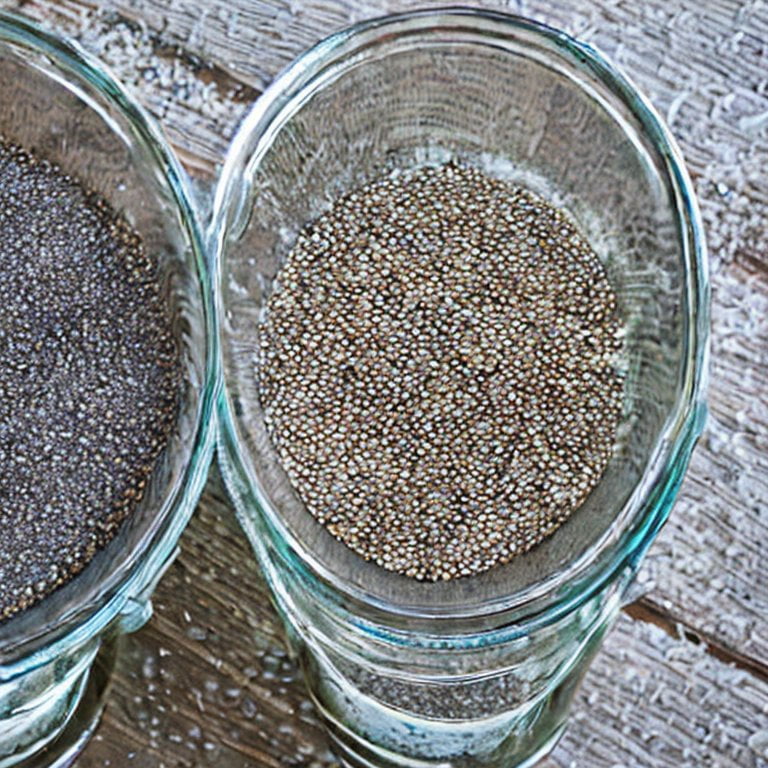
Chia seeds are native to Central and South America, where they have been used for centuries as a staple food. The ancient Maya and Aztec civilizations valued chia seeds for their ability to provide sustained energy and nutrition. In recent years, chia seeds have gained popularity around the world due to their numerous health benefits.
Chia seeds are high in fiber, with one serving (28 grams) providing 11 grams of fiber. This makes them a great option for those looking to increase their fiber intake and improve digestion. Chia seeds are also high in omega-3 fatty acids, which are essential for heart health and brain function. In addition, chia seeds are a good source of plant-based protein, with one serving providing 4 grams of protein.
How to Make a Chia Egg
One of the most popular ways to incorporate chia seeds into your diet is by using them as a vegan egg substitute, known as a chia egg. To make a chia egg, you will need:
- 1 tablespoon of ground chia seeds
- 3 tablespoons of water
To prepare the chia egg, simply mix the ground chia seeds and water together in a small bowl. Allow the mixture to sit for a few minutes until it becomes thick and gel-like. You can then use the chia egg as a substitute for one whole egg in most recipes.
(Note: This is similar to soaking chia seeds)
Chia Egg Benefits
Using chia seeds as an egg substitute is a great option for those who follow a vegan or plant-based diet, as it provides a source of protein and nutrients without the use of animal products. It is also a good choice for those who are allergic to eggs or have an egg intolerance. Chia eggs can be used in a variety of recipes, including baked goods, pancakes, and even savory dishes such as vegan quiches.
One of the benefits of using chia seeds as an egg substitute is that they are readily available and easy to store. Chia seeds can be found at most health food stores or online, and they have a long shelf life, making them a convenient option for those who don’t have access to fresh eggs.
Another benefit of chia eggs is that they are relatively low in calories and fat, making them a good choice for those who are trying to watch their intake of these nutrients. One chia egg contains only 60 calories and 3 grams of fat, compared to a whole egg, which contains around 70 calories and 5 grams of fat.
When Not to Use a Chia Egg
However, it is important to note that chia seeds may not work as a perfect replacement for eggs in all recipes. They work best as a binding agent in recipes such as baked goods, but may not work as well in recipes that rely on the structure and texture of eggs, such as omelets or scrambles.
In these cases, it may be necessary to use a different egg substitute or add additional ingredients to the recipe to achieve the desired texture and structure. You may want to consider a flax egg instead. (See Flax Egg vs Chia Egg)
How Much Chia Equals 2 Eggs?
To replace two eggs in a recipe, you will need to use 6 tablespoons of chia seeds mixed with 9 tablespoons of water. This will provide a similar binding and moisture-retaining effect as two eggs.
Chia Egg vs Egg
The chia egg works well as a binding agent in recipes, but it may not provide the same leavening properties as a regular egg. You may need to use a little extra baking powder or another leavening agent to help your baked goods rise.
Chia eggs are a good choice for vegans or people with egg allergies, but they may not work as well in all recipes. You may need to experiment with different ratios of chia seeds to water and try different leavening agents to get the desired results.
It’s also worth noting that chia seeds are high in fiber and omega-3 fatty acids, which can be beneficial for overall health. However, they are also relatively high in calories and should be consumed in moderation as part of a balanced diet.
Chia Egg to Egg Ratio
The general ratio for using chia seeds as a replacement for eggs in baking and cooking is 1 tablespoon of chia seeds to 3 tablespoons of water. This creates a chia egg that can be used in place of one egg in a recipe.
Chia Egg Recipe
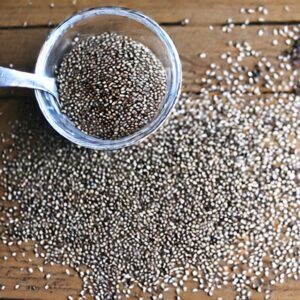
Chia Egg Recipe
Ingredients
- 1 tablespoon of ground chia seeds
- 3 tablespoons of water
Instructions
- To prepare the chia egg, simply mix the ground chia seeds and water together in a small bowl.1 tablespoon of ground chia seeds, 3 tablespoons of water
- Allow the mixture to sit for a few minutes until it becomes thick and gel-like.
- You can then use the chia egg as a substitute for one whole egg in most recipes.
Final Thoughts
Overall, chia seeds are a nutritious and convenient option for those looking to incorporate more plant-based protein and fiber into their diet. Using chia eggs as a vegan egg substitute is a great way to add these nutrients to your recipes, while also providing a source of sustained energy and nutrition.
Lance has been passionate about the plant-based diet and we have been following a whole food plant-based diet for over 5 years. We focus on health, natural healing, weight management, animal rights, and the health of the planet and environment by focusing on whole plant-based foods and sustainable practices.
Learn more at the About Me page and follow on social media at the links below.


